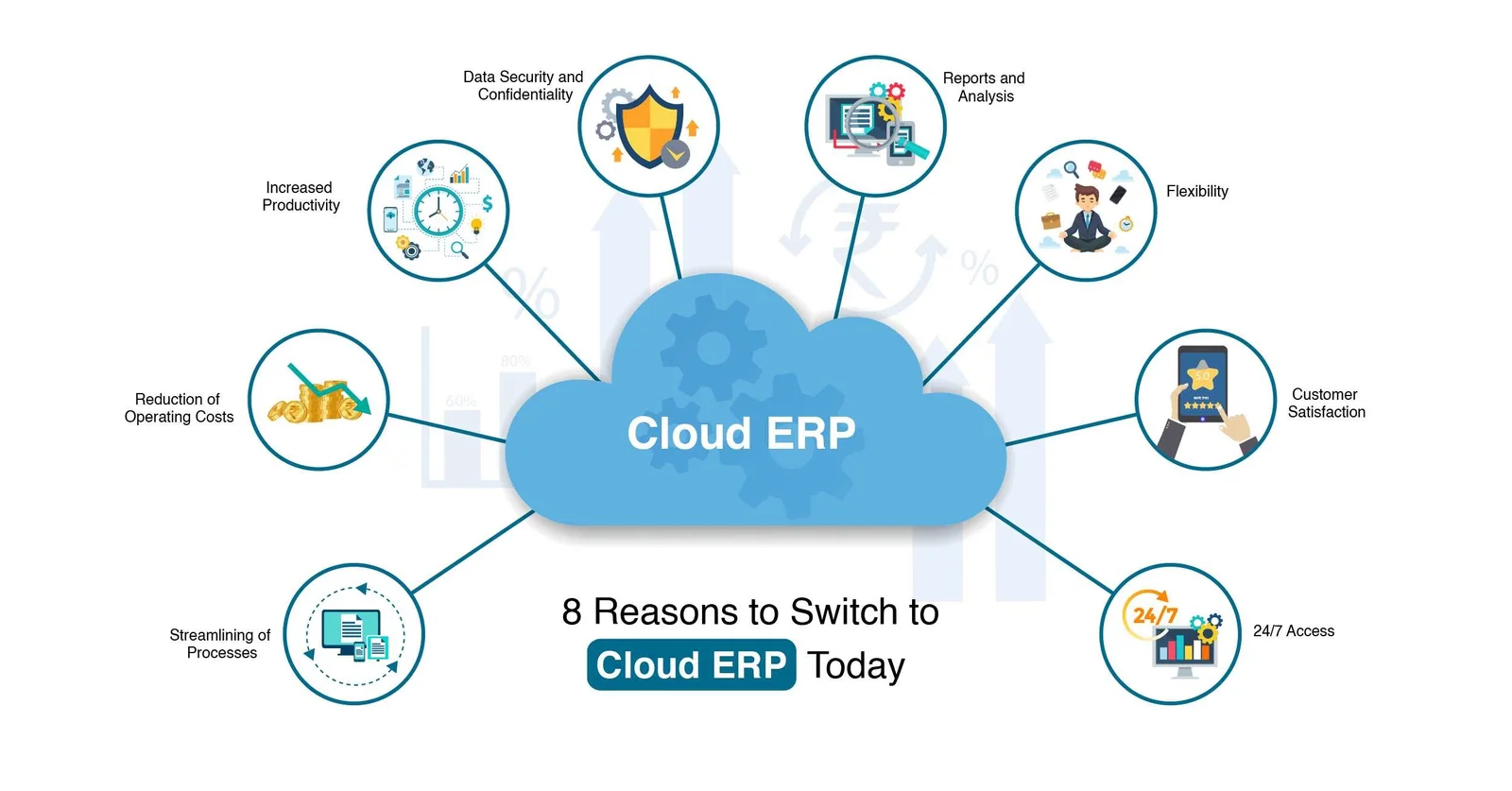Introduction to Cloud ERP
In today’s fast-paced business landscape, staying competitive requires efficient management of resources, data, and processes. Enterprise Resource Planning (ERP) software plays a pivotal role in streamlining operations, optimizing workflows, and enhancing decision-making. An international survey of ERP users indicated that 64% of companies use SaaS, 21% use cloud ERP, and only 15% use on-premises. With the advent of cloud technology, ERP systems have evolved, offering more flexibility and scalability.

However, choosing the best ERP cloud software can be a daunting task. Let’s walk you through the key factors to consider when making this crucial decision.
The key factors to consider when choosing the ERP cloud software are as follows:
- Assess Your Business Needs The first step in selecting the right ERP cloud software is to assess your business needs comprehensively. Involve stakeholders from different departments to identify pain points and areas that require improvement. Create a detailed list of functionalities and features that are essential for your organization’s success. By understanding your specific requirements, you can narrow down your options effectively.
- Cloud vs. On-Premises ERP Before diving into the world of cloud ERP solutions, consider whether you prefer a cloud-based or on-premises system. Cloud ERP software offers benefits such as scalability, accessibility from anywhere, and automatic updates, while on-premises ERP may provide greater control over data but require more infrastructure and maintenance. Choose the option that aligns with your organization’s IT strategy and resources.
- Scalability As your business grows, so should your ERP system. Ensure that the ERP cloud software you choose can scale seamlessly to accommodate increased data and user requirements. Scalability is essential for long-term cost-effectiveness and flexibility.
- Integration Capabilities Your ERP system should integrate seamlessly with your existing software and systems. This includes accounting software, CRM, HR systems, and more. Integration capabilities reduce data silos and enhance data accuracy, leading to better decision-making.
- Data Security and Compliance Protecting your sensitive data is paramount. Assess the security measures and certifications of the ERP cloud software provider. Ensure they adhere to industry-specific compliance standards such as GDPR, HIPAA, or ISO 27001, depending on your business’s needs.
- User-Friendly Interface A user-friendly interface is crucial for user adoption. Employees from various departments should find it easy to navigate the ERP system. Conduct usability testing or request demos to gauge the software’s user-friendliness.
- Customization and Flexibility Every business is unique, so your cloud ERP software should be adaptable to your specific processes. Look for a system that allows customization without requiring extensive coding. This flexibility will ensure the software can evolve with your changing needs.
- Mobile Accessibility In an era of remote work and mobility, having mobile accessibility is essential. Ensure that the ERP cloud software offers a responsive design or dedicated mobile apps for easy access on smartphones and tablets.
- Support and Training The quality of support and training provided by the ERP vendor is crucial. Consider the availability of customer support, training materials, and resources. Reliable support can save your organization time and resources in the long run.
- Total Cost of Ownership (TCO) Evaluate the TCO of the ERP cloud software. Consider not only the upfront costs but also ongoing expenses like licensing, maintenance, and potential customization. A well-planned budget will prevent unexpected financial burdens down the road.
- Vendor Reputation and Reliability Research the vendor’s reputation in the industry. Look for customer reviews, case studies, and references to gauge their reliability. A trustworthy vendor is more likely to provide a stable and dependable ERP solution.
- Future Updates and Innovation Ensure that the ERP software vendor is committed to innovation and regular updates. This will keep your system current with industry trends and technology advancements, preventing it from becoming obsolete.
- Trial Period and Proof of Concept Whenever possible, opt for a trial period or a proof of concept before making a final decision. This hands-on experience will help you assess whether the ERP cloud software aligns with your expectations and requirements.
- Long-Term Strategy Consider your organization’s long-term growth and strategic goals. The ERP system you choose should align with your plans and support your business’s expansion.
Conclusion
Selecting the best ERP cloud software is a critical decision that can significantly impact your organization’s efficiency and competitiveness. By thoroughly assessing your needs, and considering factors like scalability, integration capabilities, security, user-friendliness, and vendor reputation, you can make an informed choice that sets your business on a path to success. Remember that the right ERP system should not only meet your current requirements but also adapt and grow with your organization in the years to come.
Ikyam’s SAP solutions empower businesses with streamlined financial processes, real-time data insights, and robust compliance tools, ensuring efficient and effective finance management.
Ikyam Solutions, a renowned leader in SAP ERP cloud solutions, is committed to providing tailored software that aligns perfectly with your business needs. With a deep understanding of diverse industries and a track record of delivering innovative SAP ERP solutions, IKYAM Solutions ensures that you get the right solution to drive your business forward.
To know more: https://ikyam.com/sap-for-finance/






